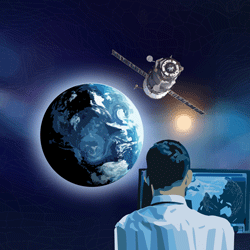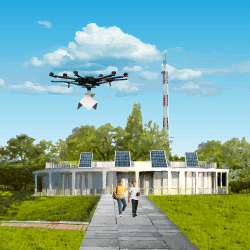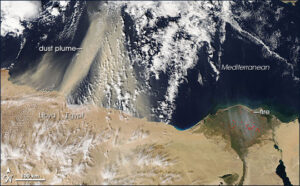ABC(t) team
The ABC(t) (Atmosphère-Biosphère-Climatologie par télédétection) team studies climatic variables by analysing atmospheric and surface radiation, using active and passive remote sensing measurements from the ground and space.
The ABC(t) (Atmosphere-Biosphere-Climatology by remote sensing) : team central theme is the study of climatic variables and processes based on the analysis of radiation emitted and scattered by the atmosphere and the surface, by active and passive remote sensing from the ground and space. In particular, the team has internationally recognised expertise in the analysis of multi-spectral satellite observations and in the development of innovative instruments, based on in-depth knowledge of spectroscopy, advanced modelling of direct and inverse radiative transfer, calibration/validation, various inverse methods (Bayesian, neuronal, etc.), analysis of data over long time series. The resulting restitution and understanding of atmospheric and surface variables is an essential resource for the study of climate variability and evolution as well as for the study of the planet’s radiation balance. They also represent key data for the validation of general circulation models. The scientific themes of the team focus on the study of the characterisation of the atmosphere and continental surfaces using the coupling of passive infrared sounders (at nadir and limbus) and active instruments (lidars): characterisation of greenhouse gases (CO2, CH4, H2O), clouds, dust aerosols and the radiative properties of continental surfaces. In line with its scientific expertise and research themes, the team is strongly involved in the proposal, preparation and operation of space missions, in particular with CNES and ESA. It coordinates activities around the IASI, IASI-NG and Merlin missions, and participates in the MicroCarb, Flex and GeoCarb mission groups.
DPAO team
The DPAO (Dynamique et Physique de l’Atmosphère et de l’Océan) team studies the fundamental mechanisms of the dynamics and physics of geophysical fluids (atmosphere and ocean), from the turbulent to the planetary scale.
The DPAO team studies the dynamics and physics of the Earth’s fluid envelopes, atmosphere and ocean, from the turbulent to the planetary scale. It analyzes the mechanisms using a rich array of observation tools (satellite, measurement campaigns), and a hierarchy of theoretical and numerical models.
Among the fundamental geophysical structures of interest to the team’s researchers are atmospheric and oceanic eddy structures. In the ocean, the subjects of study focus on the role of these structures in heat transfer, biogeochemical cycles and interactions with the atmosphere. For the atmosphere, current research focuses on the coupling between the organisation of convection and the formation of tropical cyclones, the evolution of extra-tropical cyclones from the Mediterranean basin to the polar seas, as well as on the link between stratospheric anticyclones of synoptic to global scale and aerosols from forest fires.
More generally, turbulence in geophysical fluids is a central object of study in the team, which is involved in theoretical and observational advances on various aspects ranging from oceanic turbulence to convective clouds and their impact on the Earth’s radiation balance.
Another aspect of the dynamics at the heart of DPAO’s work is that of atmospheric oscillations of various scales. Gravity waves emitted by convective clouds, mountains or flow instabilities are studied in terms of their impact on cloud variability and stratospheric circulation. The team is also interested in the large-scale waves responsible for synoptic and seasonal variability at mid and polar latitudes, as well as climate oscillations and their effects in the context of global change.
To make progress on these aspects, DPAO researchers combine advanced conceptual and numerical modeling approaches with ambitious experimental research including laboratory experiments, new satellite measurements and measurement campaigns at sea, in airborne and under balloons. They focus on quantifying the roles of these processes in the climate system and design new approaches to represent them in models and assess their impacts on weather forecasting. As such, the team contributes to the development of various components of the IPSL climate model and to the evaluation of climate models.

EMC3 team
The EMC3 (Etude et Modélisation du climat et du changement climatique) team develops the general circulation model LMDz and studies the physical mechanisms that control the dynamics of climate and climate change.
The EMC3 (Etude et Modélisation du climat et du changement climatique) team has been developing the General Circulation Model (GCM) LMDz since its origin (1990s) and became a community code. This model is the atmospheric component of the IPSL Earth System model (one of the two French climate models). Within the framework of the IPSL’s Climate Modelling Centre, this model has several hundred users in France and abroad, and since 2003 has been participating in the international CMIP project for the intercomparison of climate models within the World Climate Research Programme (WCRP) of the World Meteorological Organisation (WMO). At the same time, using LMDz, other models and observations, the team is studying the physical processes that govern climate and climate change. It plays a leading role in many of the WCRP’s international activities, in the preparation of IPCC reports and in other expert work on climate change. The team has strong links with mesoscale modelling, modelling of global atmospheres, continental surfaces and observations (analysis of data from space or instrumented sites such as SIRTA, involvement in field campaigns). These collaborations are an asset for the study of critical climate processes (e.g. clouds, convection, aerosols, surface hydrology) and the development of original parameterisations for large-scale models.

Equipe ABC(t)
L’équipe ABC(t) (Atmosphère-Biosphère-Climatologie par télédétection) étudie les variables climatiques par analyse du rayonnement atmosphérique et de surface, à l’aide de mesure de télédétection active et passive, depuis le sol et l’espace.
Equipe ABC(t) (Atmosphère-Biosphère-Climatologie par télédétection) : La thématique centrale de l’équipe est l’étude des variables et des processus climatiques à partir de l’analyse du rayonnement émis et diffusé par l’atmosphère et la surface, par télédétection active et passive depuis le sol et l’espace. L’équipe possède en particulier une expertise internationalement reconnue à la fois dans l’analyse d’observations satellitaires multi-spectrales et dans la réalisation d’instruments innovants, basée sur des connaissances approfondies en spectroscopie, modélisation avancée du transfert radiatif direct et inverse, calibration/validation, méthodes inverses variées (Bayésiennes, neuronale, …), analyse des données sur de longues séries temporelles. La restitution et la compréhension des variables atmosphériques et de surface qui en découlent sont une ressource essentielle pour l’étude de la variabilité et de l’évolution du climat de même que pour l’étude du bilan de rayonnement de la planète. Elles représentent aussi des données clés pour la validation des modèles de circulation générale. Les thèmes scientifiques de l’équipe s’orientent autour de l’étude de la caractérisation de l’atmosphère et des surfaces continentales à l’aide du couplage des sondeurs infrarouges passifs (au nadir et au limbe) et des instruments actifs (lidars) : caractérisation des gaz à effet de serre (CO2, CH4, H2O), des nuages, des aérosols de poussière et des propriétés radiatives des surfaces continentales. En lien avec son expertise scientifique et ses thèmes de recherche, l’équipe est fortement impliquée dans la proposition, la préparation et l’exploitation des missions spatiales, en particulier auprès du CNES et de l’ESA. Elle coordonne les activités autour des missions IASI, IASI-NG et Merlin, et participe aux groupes missions MicroCarb, Flex et GeoCarb.

Equipe DPAO
L’équipe DPAO (Dynamique et Physique de l’Atmosphère et de l’Océan) étudie les mécanismes fondamentaux de la dynamique et de la physique des fluides géophysiques (atmosphère et océan), de l’échelle turbulente à l’échelle planétaire.
L’équipe DPAO étudie la dynamique et la physique des enveloppes fluides de la Terre, atmosphère et océan, de l’échelle turbulente à l’échelle planétaire. Elle en analyse les mécanismes à l’aide d’un riche éventail d’outils d’observations (satellite, campagnes de mesures), et d’une hiérarchie de modèles théoriques et numériques.
Parmi les structures géophysiques fondamentales auxquelles s’intéressent les chercheurs de l’équipe figurent les structures tourbillonnaires atmosphériques et océaniques. Dans l’océan, les sujets d’étude porte sur le rôle de ces structures dans les transferts de chaleur, les cycles biogéochimiques ainsi que les interactions avec l’atmosphère. Pour l’atmosphère, les recherches actuelles portent sur le couplage entre l’organisation de la convection et la formation des cyclones tropicaux, l’évolution des cyclones extra tropicaux du bassin méditerranéen aux mers polaires ainsi que sur le lien entre anticyclones stratosphériques d’échelle synoptique à planétaire et aérosols issus de feux de forêts.
Plus généralement, la turbulence dans les fluides géophysiques est un objet d’étude central dans l’équipe, qui s’implique dans des avancées théoriques et observationnelles sur des aspects variés allant de la turbulence océanique aux nuages convectifs et leur impact sur le bilan radiatif de la Terre.
Un autre aspect de la dynamique au cœur des travaux de DPAO est celle des oscillations atmosphériques d’échelles variées. Les ondes de gravité émises par les nuages convectifs, les montagnes ou les instabilités de l’écoulement sont étudiées sous l’angle de leurs impacts sur la variabilité nuageuse et sur la circulation en stratosphère. L’équipe s’intéresse également aux ondes de grande échelle responsables de la variabilité synoptique et saisonnière aux latitudes moyennes et polaires ainsi qu’aux oscillations climatiques et à leurs effets dans le contexte du changement global.
Pour progresser sur ces aspects, les chercheurs de DPAO combinent des approches avancées de modélisation conceptuelle et numérique à une ambitieuse recherche expérimentale incluant expériences de laboratoire, nouvelles mesures satellitaires et campagnes de mesure en mer, aéroportées et sous ballons. Ils s’attachent à quantifier les rôles de ces processus dans le système climatique et conçoivent de nouvelles approches pour les représenter dans les modèles et évaluer leurs impacts sur la prévision météorologique. A ce titre, l’équipe contribue au développement de diverses composantes du modèle de climat de l’IPSL et à l’évaluation des modèles climatiques.

Equipe EMC3
L’équipe EMC3 (Etude et Modélisation du climat et du changement climatique) développe le modèle de circulation générale LMDz et étudie les mécanismes physiques qui contrôlent la dynamique du climat et du changement climatique.
Equipe EMC3 (Etude et Modélisation du climat et du changement climatique) : L’équipe développe le Modèle de Circulation Générale (GCM) LMDz depuis son origine (années 90) et devenu code communautaire. Ce modèle est la composante atmosphérique du modèle Système Terre de l’IPSL (l’un des deux modèles de climat français). Dans le cadre du Centre de Modélisation du Climat de l’IPSL, ce modèle compte plusieurs centaines d’utilisateurs en France et à l’étranger, et participe depuis 2003 au projet international CMIP d’intercomparaison de modèles climatiques au sein du Programme Mondiale de Recherche sur le Climat (WCRP) de l’Organisation Mondiale de la Météorologie (WMO). En parallèle, à l’aide de LMDz, d’autres modèles et d’observations, l’équipe étudie les processus physiques qui gouvernent le climat et le changement climatique. Elle joue un rôle moteur dans de nombreuses activités internationales du WCRP, dans l’élaboration des rapports du GIEC et dans d’autres travaux d’expertise sur le changement climatique. L’équipe entretient des liens forts avec la modélisation à méso-échelle, la modélisation des atmosphères planétaires, les surfaces continentales et les observations (analyse de données issues du spatial ou de sites instrumentés tels le SIRTA, implication dans des campagnes de terrain). Ces collaborations sont un atout pour l’étude des processus critiques pour le climat (par ex. nuages, convection, aérosols, hydrologie de surface) et le développement de paramétrisations originales pour les modèles de grande échelle.

Equipe InTro
L’équipe InTro étudie à l’échelle régionale les processus physico-chimiques de fine échelle avec leur impact sur le climat et sur le secteur de l’énergie.
Étude et prévision de l’impact de la variabilité et du changement climatique sur le secteur de l’énergie.
Le secteur de l’énergie est sensible aux conditions climatiques via la sensibilité thermique de la demande d’énergie (chauffage / climatisation), via la dépendance météorologique de la production d’énergie renouvelable (solaire / éolien) et via les dégâts aux installations occasionnés par les événements extrêmes. Inversement, les principales sources d’énergie en France et dans le monde étant les combustibles fossiles, la consommation d’énergie est la principale contribution au changement climatique. De nombreuses questions scientifiques émergent ainsi à l’interaction entre science du climat, ingénierie énergétique et économie. Résoudre ces questions est d’autant plus critique qu’il est impératif de réduire les émissions de gaz à effet de serre par le secteur de l’énergie. L’équipe InTRo étudie ces questions dans le cadre du centre Energy 4 Climate (E4C) center.
Chimie et transport des polluants atmosphériques : de l’échelle urbaine à l’échelle hémisphérique
L’étude de la composition de l’atmosphère est un sujet de recherche important pour l’équipe InTRo. En particulier, l’équipe coordonne le développement du modèle de chimie-transport CHIMERE, qui est utilisé largement en France et à l’international pour des applications aussi bien scientifiques qu’opérationnelle, incluant les plate-forme de prévision nationale Prev’Air et européenne CAMS. Les questions scientifiques étudiées dans l’équipe incluent les émissions liées aux feux de forêt (avec le modèle APIFLAME), les poussières minérales issues des zones arides, le transport des panaches volcaniques et le développement de techniques de downscaling pour étudier la qualité de l’air à l’échelle urbaine et l’exposition des populations avec le modèle EXPLUME.
Climat régional et cycle de l’eau
L’étude du cycle de l’eau dans InTRo s’est concentrée historiquement sur le bassin méditerranéen dans le cadre des initiatives HyMEx et MedCORDEX. L’Amérique du Sud est devenue plus récemment une priorité, en collaboration avec l’université de Buenos Aires. Dans le bassin méditerranéen, les études sur le cycle hydrologique et sur les événements extrêmes (précipitations extrêmes, sécheresses) se font en partie avec le modèle régional couplé RegIPSL, en développement dans l’équipe InTRo en collaboration avec d’autres équipes de l’IPSL. Les sujets étudiés par l’équipe incluent les interactions entre aérosols et précipitation et le cycle hydrologique des grands bassins versants. Une attention particulière est portée aux usages anthropiques de l’eau et aux zones où l’interaction surface/atmosphère est particulièrement intense, comme le Pantanal en Amérique du Sud. L’étude du cycle hydrologique à l’échelle régionale est l’une des principales motivations de la forte implication de l’équipe InTRo dans le développement du modèle régional couplé RegIPSL.
Le cœur dynamique DYNAMICO
En collaboration avec d’autres équipes du LMD et de l’IPSL, l’équipe InTRo est un contributeur majeur au développement d’un nouveau cœur dynamique pour LMDZ, le modèle de circulation atmosphérique générale (GCM) inclus dans le modèle couplé de l’IPSL. Le principal objectif de DYNAMICO est de reformuler l’advection et la dynamique de LMDZ sur une grille icosaédrique, tout en maintenant ou en améliorant leurs propriétés d’exactitude, de conservation et de dispersion d’ondes. Une implémentation efficace sur les architectures présentes et futures de supercalculateurs est également un objectif important. La mise en place d’une capacité à utiliser un maillage non structuré afin de faire varier la résolution de façon souple est en cours. Un but majeur, plus large, est de réexaminer tous les choix touchant le cœur dynamique, notamment l’approximation traditionnelle / de l’atmosphère mince, la coordonnée verticale et la stratégie de couplage avec la physique.
Source image : earthobservatory.nasa.gov
Crédit image : NASA image courtesy Jeff Schmaltz, MODIS Rapid Response Team at NASA GSFC.

Equipe Planéto
L’équipe Planéto (Planétologie) étudie les atmosphères planétaires du Système Solaire comme des exoplanètes, via la modélisation des processus à différentes échelles et via le soutien aux missions spatiales, à l’analyse et à l’interprétation de leurs données.
Equipe Planéto (Planétologie) : L’équipe Planéto regroupe les activités de recherche concernant les atmosphères autres que celle de la Terre. Les sujets d’étude de l’équipe sont d’une part la physique et la dynamique des diverses atmosphères du système solaire et des exoplanètes, d’autre part l’enquête sur l’évolution de ces systèmes et sur les origines de la vie. Ces activités sont soutenues par le développement de modèles, de la même manière que pour l’étude de la Terre : Modèle de Climat Global (LMDz), mais aussi modèles à plus petite échelle (simulations grands-tourbillons, modèles méso-échelle). L’équipe est également impliquée dans la recherche spatiale, via le soutien au développement instrumental, à la préparation des missions et à l’analyse des données. Bien que les principaux objets d’études soient les atmosphères des planètes et satellites telluriques du système solaire (Mars, Vénus, Titan), l’équipe étudie également des atmosphères des planètes géantes (Saturne, Jupiter), aux climats passés pour explorer les évolutions de ces diverses atmosphères, aux atmosphères plus fines et froides des confins du système solaire (Pluton, Triton), enfin à la diversité des atmosphères des planètes extrasolaires dont la découverte et l’étude sont en pleine phase d’expansion.

Equipe SIRTA
L’équipe SIRTA du LMD vise à documenter sur le long terme les processus radiatifs, physiques et dynamiques au sein de l’atmosphère, en particulier ceux liés aux nuages et leurs précurseurs tels que les aérosols et la vapeur d’eau.
Equipe SIRTA du LMD : Le SIRTA est un Site multi-instrumenté national dédié à l’observation de l’atmosphère, localisé à l’Ecole polytechnique. Le SIRTA a été fondé en 1999 à l’initiative de l’IPSL pour fédérer les recherches (fondamentales ou appliquées) et les activités d’enseignement des laboratoires de la région parisienne dans les domaines de l’instrumentation et des mesures atmosphériques. Le SIRTA est un outil de référence aux niveaux européen et international. Au regard de la contribution du LMD au fonctionnement du SIRTA en termes de soutien technique et de recherches scientifiques, une équipe dédiée au LMD étudie plus particulièrement les impacts sur le climat régional des nuages, les processus pilotant les nuages bas et brouillard d’hiver et les nuages convectifs d’été pouvant créer des orages violents, la nature des différentes sources d’aérosols rencontrés en région parisienne et l’impact des aérosols et nuages sur la variabilité et la prévisibilité de la production d’électricité photovoltaïque en conditions réelles.

InTro team
The InTro (Interfaces et troposphère) team studies at the regional level the fine-scale physico-chemical processes and their impact on the climate.
Assessing and predicting the impact
of climate variability/change on energy systems
The energy sector is significantly affected by meteorological conditions: through the thermal sensitivity of the energy consumption (heating/cooling), the conversion of variable renewable energy (solar/wind) and damages caused by extreme events on assets. In return, most
energy sources in the world and in France being fossil fuels, energy use is the largest contribution to global warming. Many research questions thus emerge at the crossroad between climate science and energy engineering and economics. Tackling these issues is made more critical by the need to reduce the greenhouse gas emissions of the energy sector. The InTro team addresses some of these questions as part of the Energy 4 Climate (E4C) center.
Chemistry and transport of atmospheric pollutants from urban to hemispheric scales
The study of the atmospheric composition is an important research topic in the InTRo team. In particular, the team coordinates the development of the CHIMERE chemistry-transport model, which is largely used in France and abroad for research and operational air quality simulations, including the French and European forecast
platforms Prev’Air and CAMS. The main topics of research in this field include wildfire emissions with the development of the APIFLAME model, mineral dust emissions from arid areas and their subsequent transport, the transport of volcanic plumes as well as the development of downscaling techniques to address urban scale atmospheric pollution and population exposure with the EXPLUME model.
Regional climate and water cycle
Study of the Water cycle in InTRo is focused on
the Mediterranean region, in the framework of international
initiatives HyMEx and MedCORDEX. South America has become recently a new priority and builds on collaborations with the University of Buenos Aires. In the Mediterranean area, studies of the hydrological cycle and hydrological extremes (extreme precipitation, dry spells) has relied in part on the RegIPSL regional coupled modelling
platform, under development in the InTRo team in collaboration with other IPSL teams. Scientific
focuses in the team include interactions between aerosols and
precipitation, studying the water cycle of major hydrologic basins. A particular focus is the anthropogenic use of the water and areas of strong surface/atmosphere interactions like the wetlands of the Pantanal in South America. Study of the regional water cycle is one of the strong reasons why the InTRo team is currently strongly involved in the development of the
In collaboration with other teams at LMD and IPSL, the Intro team is a core contributor to the development of a new dynamical core (fluid solver) for LMDZ, the atmospheric general circulation model (GCM) part of IPSL-CM Earth
System Model. The main role of DYNAMICO is to reformulate in LMDZ the horizontal advection and dynamics on an icosahedral grid, while preserving or improving their qualities with respect to accuracy, conservation laws and wave dispersion. Efficient implementation on present and future supercomputing architectures is also a key issue addressed by DYNAMICO. A grid refinement strategy based on variable-resolution, fully unstructured meshes is under development. A broader goal is to revisit all fundamental features of the dynamical core, especially the shallow-atmosphere/traditional approximation, the vertical coordinate and the coupling with physics.
Image source: earthobservatory.nasa.gov
Image credit: NASA image courtesy Jeff Schmaltz, MODIS Rapid Response Team at NASA GSFC.
Planéto team
Thea Planéto (Planétologie) team studies the planetary atmospheres of the Solar System as exoplanets, by modelling processes at different scales and by supporting space missions and the analysis and interpretation of their data.
The Planéto (Planétologie) team brings together research activities concerning atmospheres other than that of the Earth. The team’s subjects of study are, on the one hand, the physics and dynamics of the various atmospheres of the solar system and exoplanets, and, on the other hand, the investigation of the evolution of these systems and the origins of life. These activities are supported by the development of models, in the same way as for the study of the Earth: Global Climate Model (LMDz), but also smaller scale models (large-vortex simulations, mesoscale models). The team is also involved in space research, through support for instrument development, mission preparation and data analysis. Although the main objects of study are the atmospheres of the planets and telluric satellites of the solar system (Mars, Venus, Titan), the team also studies the atmospheres of giant planets (Saturn, Jupiter), past climates to explore the evolution of these various atmospheres, the finer and colder atmospheres of the outer solar system (Pluto, Triton), and finally the diversity of the atmospheres of extrasolar planets whose discovery and study are in full expansion phase.

SIRTA team
The SIRTA team aims to document the long-term radiative, physical and dynamic processes in the atmosphere, in particular those related to clouds and their precursors such as aerosols and water vapour.
The SIRTA team takes care of the national multi-instrumental observatory dedicated to the observation of the atmosphere, located at the Ecole Polytechnique. The SIRTA was founded in 1999 on the initiative of the IPSL to federate the research (fundamental or applied) and teaching activities of laboratories in the Paris region in the fields of atmospheric instrumentation and measurements. The SIRTA is a reference tool at the European and international levels. With regard to the contribution of the LMD to the SIRTA operation in terms of technical support and scientific research, a team dedicated to the LMD is studying more particularly the impacts of clouds on the regional climate, the processes driving winter low clouds and fog and summer convective clouds that can create violent thunderstorms, the nature of the different sources of aerosols encountered in the Paris region and the impact of aerosols and clouds on the variability and predictability of photovoltaic electricity production in real conditions.



